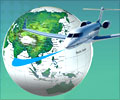Global climate changes are threatening New Zealand's top export- its pure and pristine environment.
It may seem strange that a country the size of Britain with a population of only 4.1 million and few industrial smokestacks is facing accusations that its food and tourism industries are helping destroy the global environment."New Zealand's reputation as a country with a clean and green environment is priceless," Prime Minister Helen Clark said recently.
"Failure to protect it by inaction on sustainability, or dragging our feet on climate change as the climate change deniers insist, would pose a considerable economic risk to New Zealand, and that would be devastating to our reputation," she said.
The impact of greenhouse gases from transport, especially aviation, on climate change mean New Zealand's environmental credentials are coming under new scrutiny from distant markets.
Environmentally-conscious European, American and Asian tourists are being asked by campaigners if they can justify flying 20,000 kilometres (12,000 miles) for a holiday on the opposite side of the world.
They are also being asked why they are eating lamb, beef and butter from New Zealand when they could be buying from local farmers.
Advertisement
Of New Zealand's 2.42 million visitors last year, 54 percent were from distant markets in Europe, the Americas and Asia.
Advertisement
-- Impact of long distance travel being used to bash New Zealand --
Tourism New Zealand said concerns about long distance air travel were a worry.
"So far, there has been no noticeable impact on long haul visitor arrivals that we can directly attribute to concerns over sustainability," Tourism New Zealand chief executive George Hickton told AFP.
"But it is a situation we are watching closely, particularly in the United Kingdom, our second largest market where concern over the sustainability issue is growing."
The impact of long distance transport on climate change has also been used to attack New Zealand's food exports.
A former British cabinet minister Stephen Byers claimed last year a kilogram of kiwi fruit airfreighted from New Zealand to Europe caused five kilograms of carbon to be released into the atmosphere and suggested a tax on so-called food miles.
The New Zealand government countered by pointing out that kiwifruit is always transported by ship, one of the most efficient methods of transport.
Of New Zealand's exports in the year to June totalling 33.4 billion dollars, the US accounted for 4.5 billion dollars and the EU 5.2 billion dollars. Both are countries where there has been a high profile debate on the environmental cost of importing food from distant countries.
Dairy products account for 21 percent of New Zealand's exports and meat 13.2 percent, while horticultural products such as kiwifruit and apples are also significant.
Critics in Britain and Germany in particular have been saying it is irresponsible to import food and drinks from the other side of the world and have urged consumers to consider the impact of "food miles".
But New Zealand researchers and politicians have been working overtime to knock down this theory.
-- Using "food miles" argument "superficial and flawed" --
Trade minister Phil Goff said foreign consumers would realise the "superficiality and flaws" of the food miles argument and would focus instead on the total carbon footprint of foods.
A report this year by Professor Carline Saunders of New Zealand's Lincoln University, showed British dairy farmers produce 31 percent more greenhouse gases than their counterparts in New Zealand, including the impact of transport to Europe.
New Zealand's temperate climate means cattle eat grass all year round and do not require other more energy intensive feed.
Goff said the food miles argument was being used cynically by some of New Zealand's competitors.
"Those running the food miles campaigns often represent producers which have a far greater greenhouse gas footprint than do the products they are complaining about from New Zealand," he said. "I think New Zealand can win the food miles debate because science will be on our side."
But he added New Zealand had to reassure foreign consumers that it was minimising greenhouse emissions and overall damage to the environment.
Last month Clark announced New Zealand would gradually introduce an emissions trading scheme, with the aim of becoming the first "truly sustainable" country in the world.
The tourism industry -- which markets itself under the slogan "100 Percent Pure New Zealand" -- has a new strategy due out in November focussed on environmental sustainability.
"It is impossible to know at this stage whether making the industry more sustainable will be enough to offset concerns about long haul air travel, but it is clear that doing nothing is not an answer," Hickton said.
Air New Zealand has also recognised the threat and late last month announced it would trial bio-fuel in association with engine maker Rolls Royce and Boeing late next year or in early 2009.
Source-AFP
ANN /J







